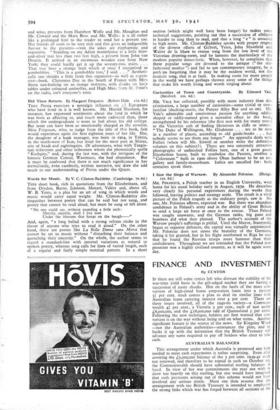Words for Music. By V. C. Clinton-Baddeley. (Cambridge. 7s. 6d.)
THIS short book, rich in quotations from the Elizabethans, and from Dryden, Burns, Johnson, Mozart, Valery and, above all, W. B. Yeats, is a plea for an art of song in which words and music would carry equal weight. Mr. Clinton-Baddeley dis- tinguishes between poetry that can be said but not sung, and poetry that cannot be read aloud, but must be sung or left alone.
" No one could say, without sounding a little arch: Merrily, merrily, shall I live now Under the blossom that hangs on the bough—"
And, again, " a long ballad with a strong refrain sticks in the throat of anyone who tries to read it aloud." On the other hand, there are poems like La Belle Dame sans Merci that cannot be set to music without " disturbing their balance and quenching their sincerity." On the whole, the author seems to regard a standard-line with internal variations as natural to spoken poetry, whereas song calls for lines of varied length, each of a regular and fairly simple metrical pattern. In a short
section (which might well have been longer) he makes some technical suggestions, pointing out that a succession of sibilants is harder to sing than to read, and that a long " e " -is unsuited to high notes. Mr. Clinton-Baddeley speaks with proper respect of the diverse efforts of Gilbert, Yeats, John Masefield and Walter de la Mare to rescue song from the low level of the Victorian drawing-room, and he laments the inarticulacy of the modern popular dance-lyric. When, however, he complains that these popular songs are devoted to the antique (" the old-
fashioned mother ") and fail to use contemporary imagery, he is perhaps forgetting that it may be the modern world, not the
modern song, that is at fault. In making room for more people in the world we have perhaps thrown away some of the things that make life worth living and worth singing about.






























 Previous page
Previous page